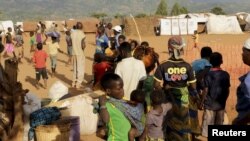Malawi's government has started revoking citizenship of refugees and asylum-seekers who they say obtained their status fraudulently.
Officials say the campaign is aimed at flushing out criminals from other countries, including Rwandan genocide suspects. But critics say the program is too broad and will ensnare legitimate refugees.
Minister of Homeland Security Zikhale Ng'oma told a televised news conference Monday that Malawi received a request from Rwanda to help track down about 55 criminals wanted for various charges who are staying in Malawi.
Ng'oma said the fugitives could not be found easily because they might have changed their identities and started using Malawian names.
As part of the manhunt, he said, the government is revoking passports and citizenships that were fraudulently obtained.
"We want to tighten our security and ensure that whosoever obtained a passport in a manner that is not normal, we have to confiscate that passport. And whoever got citizenship without right procedures, we will also revoke [that] citizenship," Ng'oma said.
In 2020, Malawi's High Court sentenced the former minister of homeland security, Uladi Mussa, to six years in jail for issuing fraudulent citizenships and passports to Burundians and Rwandans.
Ng'oma said some of the 55 suspects sought by Rwanda are wanted in connection with the deaths of over 2,000 people during the 1994 Rwandan genocide.
Last month, the government of South Africa arrested a Rwandese genocide suspect, Fulgence Kayishema. Investigations revealed that Kayishema was using a Malawian passport and names.
"Having managed to get one sample of what is happening in South Africa in regard to our passports, we believe that some people are using false identities in Malawi," Ng'oma said. "As such, as I am talking, Malawi government, we are in talks with Burundi and Rwanda in regard to those people we want to repatriate."
Ng'oma said the government is also searching for other criminals the U.N. refugee agency says may have gained official papers in Malawi.
"And the department of the UNHCR of late wrote us a letter that we need to repatriate 522 asylum-seekers who are associated with criminalities from their countries. And those people are hiding in our villages," he said.
Ng'oma said the presence of fugitives in Malawi poses a security threat, and he believes many of them are keeping guns and ammunition.
As an example, he cited a grenade explosion at the Dzaleka refugee camp last December which killed a leader for refugees from Burundi and injured five others at a market.
Ng'oma said Malawi has revoked papers for 396 foreigners in all.
However, rights groups have warned that a program aimed at criminals may victimize legitimate refugees.
"The way the government is implementing this exercise, it's targeting everyone, indiscriminately," said Michael Kayiyatsa, executive director for the Centre for Human Rights and Rehabilitation in Malawi. "And our concern is that children are being victimized, women, people with disabilities, you know, vulnerable groups who have nothing to do with what the government is alleging."
Kayiyatsa said although there could be criminal elements among some refugees and asylum-seekers, the Malawi government should find better ways of targeting the criminals.
"If the idea was to target those warlords, there was a better way to do it," he said. "If you look at countries like South Africa, they are hunting for genocide suspects, but in the process, they are not victimizing everyone. It's targeted, it's based on intelligence."
In the meantime, the Malawi government has asked those illegally keeping guns and ammunition to surrender them to police or risk being arrested.






